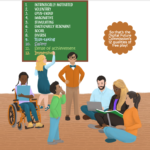
At the start of the pandemic, I downloaded the Healthy Minds app and worked my way through the whole app. It took me several weeks, using it for 15–20 minutes daily, usually at night. I’ve written about the app and the Center for Healthy Minds. (Here is a link to 3 pieces I wrote about the app. Scroll to bottom and work up to read in order.) It has been an extremely helpful tool for meeting the unique challenges of pandemic life. It’s a tool that teens could use to support well-being.
I have been considering tools for kids lately and several have come to mind (see list at bottom). But I was especially happy to see The California Healthy Minds, Thriving Kids Project launch. The project is the result of a partnership between the Child Mind Institute and the state of California. It features a bilingual series of free videos and print resources for parents, educators, and students. The first topic in this series in Understanding Feelings…and what I especially appreciate, they interview kids. And for each topic, they have 3 versions—elementary, middle school, high school. You’ll find the link to the videos for students here.
From an email announcement I received: “Videos for the elementary school age group use a whimsical story-telling approach to engage younger viewers.”
Especially for younger children, seeing and hearing peers talking about their experiences can help them realize they are not alone in how they feel. I encourage you to visit the project and watch a few of the videos with your kids, or teens. (They also have videos specifically for parents and educators.)
Additional resources
Still Quiet Place: Mindfulness for Young Children, by Amy Saltzman, MD. Audio tracks to help children find a place of calm within.
Still Quiet Place: Mindfulness for Teens. Tracks include Rest, Thought Watching, Being in the Body, Stretch and Balance, Feelings, Loving Kindness, P.E.A.C.E, Movin’, Walking, Flashlight
These are both available on iTunes, etc.
And here is a lovely video about young children and emotions from the Center for Healthy Minds. It’s from the Center for Healthy Minds Kindness Curriculum which is available for free here.


